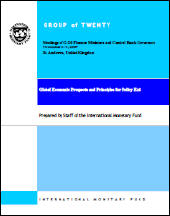Group of Twenty -- Meeting of Finance Ministers and Central Bank Governors
IMF Note on Global Economic Prospects and Principles for Policy Exit
St. Andrews — November 6-7, 2009
About the Executive Summary
The Following executive summary is from a note by the Staff of the IMF prepared for the November 7, 2009 meeting in St. Andrews of the Group of Twenty Finance Ministers and Central Bank Governors.
Read the Full text ![]()
Executive Summary
The global economy has returned to positive growth following dramatic declines. The recovery is, however, uneven and not yet self-sustaining, notably in advanced economies. Financial conditions have continued to improve, but are still far from normal.
Going forward, the global economic recovery is expected to be sluggish and inflation will remain low. The most pressing policy challenges over the near term include maintaining economic recovery momentum and, for emerging economies, dealing with capital inflows.
Principles for Policy Exit
Exit strategies should pave the way for strong, sustained and balanced economic growth. The Principles below are intended to establish common ground for the design and implementation of policies during the exit from the extraordinary support measures taken during the crisis.
Principle 1.
The timing of exits should depend on the state of the economy and the financial system, and should err on the side of further supporting demand and financial repair.
Principle 2.
With some exceptions, fiscal consolidation should be a top policy priority. Monetary policy can adjust more flexibly when normalization is needed.
Principle 3.
Fiscal exit strategies should be transparent, comprehensive, and communicated clearly now, with the goal of lowering public debt to prudent levels within a clearly-specified timeframe.
Principle 4.
Stronger primary balances should be the key driving force of fiscal adjustment, beginning with actions to ensure that crisis-related fiscal stimulus measures remain temporary.
Principle 5.
Unconventional monetary policy does not necessarily have to be unwound before conventional monetary policy is tightened.
Principle 6.
Economic conditions, the stability of financial markets, and market-based mechanisms should determine when and how financial policy support is removed.
Principle 7.
Making exit policies consistent will improve outcomes for all countries. Coordination does not necessarily imply synchronization, but lack of policy coordination could create adverse spillovers.

